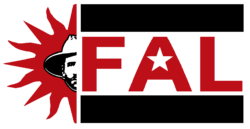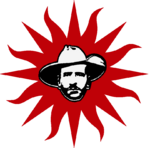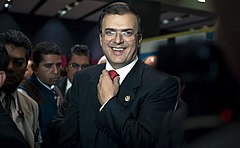Broad Liberation Front
 | |
| Abbreviation | FAL, BBF |
| Chairperson | Sérgio Lindahl |
| Deputy Chairperson | Mauricio Alcantara |
| Founder | Geraldo Saldanha |
| Founded | 1999 |
| Student wing | Broad Liberation Front Student Force |
| Youth wing | Estevista Revolutionary Youth |
| Women's wing | Ladies of the Estevista Revolution |
| Membership | 976,436 |
| Ideology | Estevismo Left-wing nationalism Left-wing populism Sotirian socialism |
| Political position | Left-wing |
| Religion | Sotirianity |
| Colors | Red, Black |
| Vanharian Legislative Assembly | 67 / 84
|
| Department Governorships | 12 / 15
|
| Election symbol | |
 | |
| Party flag | |
 | |
The Broad Liberation Front (Luzelese: Frente Ampla Libertação; Blostlandic: Bred Befrielsefront), or the FAL or BBF, is a Vanharian left-wing political party that has ruled the country since 2000. It was founded in 1999 soon after the 1999 Vanhar peace deal that ended the Esquedor conflict and opened the left into Vanharian politics. One of many left-wing parties, many of which following the ideology of Estevismo, it became the most successful and longest ruling parties in the Asterias. It is currently lead by Sérgio Lindahl and controls the Vanharian Legislative Assembly with a supermajority and a majority of the Departmental governorships in Vanhar.
After Vanhar's independence from the Asterian Federative Republic the left-wing rebels in Vanhar continued to fight the government of Bernardo Erhardsson. In 1999 the peace deal and disarmament of left-wing forces lead to the introduction of many leftist parties into politics. One of these was the Broad Liberation Front lead by lawyer Geraldo Saldanha, which would be able to unite many other left-wing parties and run on a platform of social and economic reforms, which appealed to the former-AFR state, which had been economically poor since the collapse. It would win in 2000 with over 55% of the vote.
The government of Geraldo Saldanha would be extremely successful, in 2004 the FAL would win a supermajority. In 2008 Saldanha was succeeded by Sérgio Lindahl, his deputy. He would further push more authoritarian measures to keep the FAL in power and become more adversarial with the AFR under Pereira, his wife, Eva Quinta Lindahl would become his deputy in 2017, and Foreign Minister Mauricio Alcantara would become the party's deputy chairman.
History
Foundation
After the military takeover of the Asterian Federative Republic in the 1960s, Governor Vicente Rebelo Mata was ousted by the military in 1966. The government became much more Right-wing out of fear of leftist elements after the war with Chistovodia. Separatism in Vanhar became predominantly left-wing, although some other separatists were right-wing and center. These groups became known as Separadors, they were heavily supplied by Chistovodia and North Vinalia. In the 1980s these groups became much larger and started to make pushes in Vanhar. In 1988 Bernardo Erhardsson became Governor of Vanhar and eventually he and the legislature voted for independence in 1989 as the AFR collapsed. Many of the right-wing elements of the separatists dissolved, but the left-wing ones remained, and became oppositional to the centre-right government of Erhardsson.
These leftists would join together into numerous groups, the largest being the Estevista Army of National Liberation, they allied under the Vanharian Liberation Armies. Geraldo Saldanha was supportive of these forces, but was not a member of them, he was a professor at the University of Aques. He would advocate for a peace deal between the government and leftists, the government had them many left-wing parties banned at the time. After the election of Pedro Riveira in 1996 he would become harsher on the leftists initially but eventually made a peace deal under supervision of the AFR's Jose Ramos.
After the 1999 peace deal leftists groups were disarmed and welcomed into becoming political parties and told to try and use peaceful means of gaining power. Saldanha would lead a coalition of left-wing groups that sprung out of the ELV and colleges in Vanhar. He would found the Estevist Broad Front, which eventually merged with numerous other leftist parties into the Broad Liberation Front.
Saldanha leadership
Saldanha would make his ally Hugo Frisk his deputy chairman as they would run for the 2000 elections, their platform of social, economic, and political reforms after the turbulent 1990s lead to their victory in the election with 55% of the vote.
During his first term, Saldanha would enact numerous reforms such as he would replace the subdivisions that had remained from the AFR statehood, this included getting rid of indigenous subdivisions that Saldanha claimed isolated them from participating in politics. He would make it mandatory for schools to teach the Johonai language and make it used in government documents alongside Luzelese and Blostlandic. He also would get rid of the death penalty, created a national healthcare system, and nationalised numerous industries. The FAL became increasingly popular and would win a supermajority in the 2004 elections.
However in 2004 Hugo Frisk was found to have been pocketing government funds and ousted from the government as well as the FAL, he would be replaced by Sérgio Lindahl. In 2005 the global recession hit the economy of Vanhar hard, Saldanha would punish many banks accused of worsening the economic state, and would enact a social security and public works system in 2006. Saldanha became close allies to the governments of nations like Choachua. He declared the beginning of reforms known as the "Estevist Revolution", this include further nationalisation of the economy and trials for those responsible for massacres in the 1990s. In the 2008 election, Saldanha decided to give up power and would have Lindahl become his candidate for the FAL ticket in the election. The FAL would lose some seats but retained a supermajority in the elections.
Lindahl leadership
Organization

Ideology
Estevismo

Sotirian socialism




